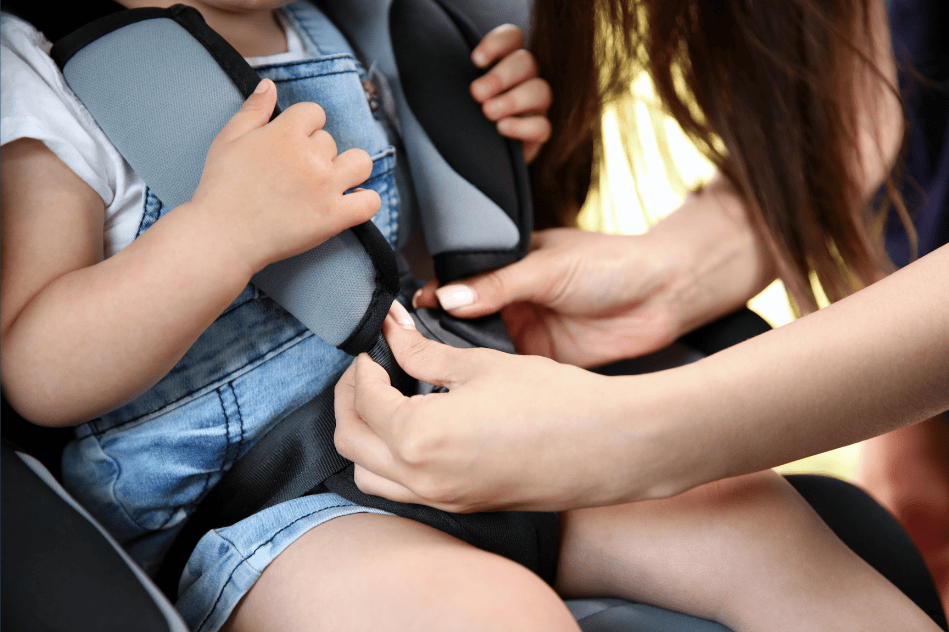Child car seats safety in the spotlight these holidays
04 December 2024-Over the past 20 years, 123 Queensland children have died as passengers in road crashes, with many of the children either not restrained properly or not at all.
-The Queensland Family and Child Commission (QFCC) is concerned many drivers are not abiding by Queensland seatbelt and child restraint laws and is encouraging parents and carers to follow best-practice child restraint safety when travelling with children.
-Australian laws relating to child restraint use and where children sit in a vehicle do not reflect best practice and lag notably behind other countries internationally.
Around six young Queenslanders have lost their lives each year as passengers in road crashes.
Data released by the QFCC ahead of the holiday period reveals more than a quarter of children who died were not using any type of restraint, including an adult seatbelt.
While Queensland’s child restraint legislation was strengthened in 2010, a third of children who have died in motor vehicle crashes since then were not secured in restraints compliant with Queensland’s road rules.
Approximately 75 per cent of children were not restrained in accordance with best practice for their age, suggesting children may be prematurely progressing to another seat type before they outgrow their existing restraint.
The QFCC recommends children remain in their child restraint until their shoulders are above the maximum shoulder height markers on the child restraint, regardless of whether they are old enough to legally transition to a different restraint type.
Children in Queensland can legally travel in the front passenger seat of a car from the age of seven; however, best practice guidelines recommend children younger than 13 be seated in a rear passenger seat. In the data for children aged between 7 and 12 years, one in four children who died in car crashes were front seat passengers.
Better adherence to best practice guidelines would increase safety for young passengers.
The data shows that fatality rates are around 2.5 times higher for children living in remote and very remote parts of Queensland. Less than 10 per cent of children living in remote and very remote parts of Queensland who were involved in fatal car crashes were found to be legally restrained, with 73 per cent not using any form of restraint, including an adult seatbelt. This, together with factors such as vast road networks, longer travel distances, higher speed limits, and poorer infrastructure, likely explain the higher death rates in remote areas of the state.
This data indicates there is a need for education campaigns designed to increase seatbelt and restraint use in remote parts Queensland, including initiatives that improve access to affordable child restraints, including in First Nations communities.
Easy-to-follow instructions on installing and using the right car restraint are available at: https://streetsmarts.initiatives.qld.gov.au/parents/child-restraints/
Read our analysis at: www.qfcc.qld.gov.au/safer-pathways-through-childhood
Quotes attributed to QFCC Principal Commissioner Luke Twyford:
“Queensland’s Child Death Register records details about the tragic deaths of children and young people across our state and provides rich information to inform all child death prevention initiatives across Queensland.
“While the rate of road crashes has steadily decreased over the past 20 years, we are still seeing too many children lose their lives in vehicle crashes.
“Fatal transport incidents and vehicle crashes are considered preventable causes of child deaths, and this data shows us that we can never be too safe when it comes to children and road safety.
“I am asking all parents and carers to always use the right car seat, booster or seatbelt for your child, make sure it is properly installed, and use it for as long as it fits your child.”
“The Christmas and New Year period is traditionally a time when families travel around the state, making this a timely reminder to prioritise your children’s safety.”
Quotes attributed to Kidsafe Queensland CEO Susan Teerds:
“Data collected during our checks and fittings service shows that over 90 per cent of the car seats checked require adjustments, or in some cases, total reinstallation. Many parents and carers are making more than one mistake at a time.”
“A properly fitted and used car seat can mean the difference between life and death. A correctly fitted child car seat can reduce the risk of injury in an accident by up to 70 per cent.”
"People are confused – the road rules do not align with best practice, and they don’t understand age vs height markers. I am very excited that the National Transport Commission are reviewing the National Road Rules which will hopefully clear up the confusion and reduce restraint misuse.”
ENDS
For media information contact:
Kirstine O’Donnell | Queensland Family and Child Commission
Phone: 0404 971 164
Email: media@qfcc.qld.gov.au
Susan Teerds | Kidsafe Queensland
Phone: 0459 128 281

